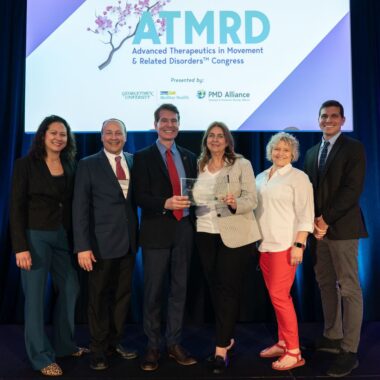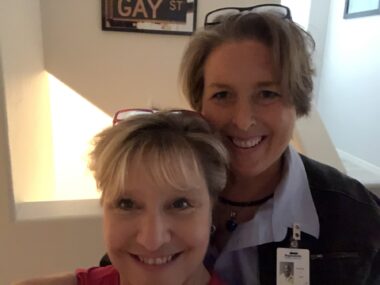Navigating the coming-out process — this time, as someone with EGPA
What I've learned from sharing my reality with others
Written by |

Sometimes I think back to when I first got sick and realized that not only was my chronic illness not going away, but I could no longer do my job. I was running a large nonprofit serving people with Parkinson’s disease and other movement disorders. I loved it. We made an impact every day, and I especially enjoyed traveling for work. Japan, France, and England were just a few of the stops.
I hadn’t planned to get sick. I hadn’t planned to lose my career. I’d been preparing to move on after a few more years, as I believe it’s healthy for organizations to have a leadership change every seven to nine years to stay fresh. I was training my successor and had started major projects I wanted to see stabilized before I transitioned out. I had a plan.
Then I got sick with eosinophilic granulomatosis with polyangiitis (EGPA), a type of ANCA vasculitis.

From left, Andréa Merriam, Fernando Pagan, MD, Ron Cohen, MD, Sandra Manning, Sarah Jones, and Yasar Torres-Yaghi, MD, attend the Advanced Therapeutics in Movement & Related Disorders Congress. (Courtesy of the PMD Alliance)
I remember being so fatigued during Zoom calls that I would literally black out. It was similar to an alcohol blackout in that I was functioning and speaking, but later had zero memory. It was happening frequently. I’d be mid-meeting and suddenly realize I had no idea what we were discussing. Thankfully, a few trusted colleagues could read the look in my eyes and quietly catch me up via private chat or step in seamlessly.
In-person meetings were the same. I stopped doing them alone. It looked smooth from the outside, but it was terrifying.
When I finally shared that I had a serious rare disease and was stepping down as CEO, I know it blindsided some people I care about deeply. I feel bad for that. But I had to come to terms with the diagnosis, the loss of my career, the grief, and everything that meant before I could talk about it with others. It doesn’t mean those people weren’t important to me, just that I needed to reconcile it all privately before I could speak it out loud.
Coming out, again
It reminds me of the process, over 35 years ago, of coming out — of sharing that women were, and are, my jam. I didn’t just wake up one day and declare it. It took years to work through the fear of judgment and uncertainty of what my life would look like, and to accept myself in a world that told me I wasn’t desirable or welcome.
That long, internal process mirrored this one. I was coming out, again — this time as someone with a chronic, systemic disease. It’s invisible to others but all-encompassing to me.

Sarah Jones and her wife, Pam Squires, are affectionately known as “SPAM” to their friends. (Photo by Sarah Jones)
There are a few things I know to be true, having walked this road before:
- You will come to see yourself as fully human, worthy of taking up space in this world.
- People who weren’t part of your internal journey may need time to catch up. They may be hurt by this. That’s OK.
- The coming-out process never really ends, but it does get easier.
Working through that process 35 years ago led me to something extraordinary — 30 years (and counting) with the love of my life! I truly feel like one of the luckiest people in the world.
Now, four years after my diagnosis, I’m starting to find a new normal. I’m sharing the reality of my experience more openly and learning how to navigate this world again — how to manage my energy, honor my limits, and live fully with EGPA. It’s not easy, but it’s my journey. And I’m figuring it out, one “spoon” at a time.
Note: ANCA Vasculitis News is strictly a news and information website about the disease. It does not provide medical advice, diagnosis, or treatment. This content is not intended to be a substitute for professional medical advice, diagnosis, or treatment. Always seek the advice of your physician or other qualified health provider with any questions you may have regarding a medical condition. Never disregard professional medical advice or delay in seeking it because of something you have read on this website. The opinions expressed in this column are not those of ANCA Vasculitis News or its parent company, Bionews, and are intended to spark discussion about issues pertaining to ANCA vasculitis.






Rhelda Mitchell
Doctors say I have AncaVasulitis that attached the kidneys !